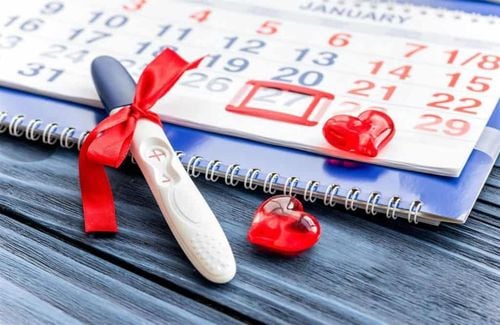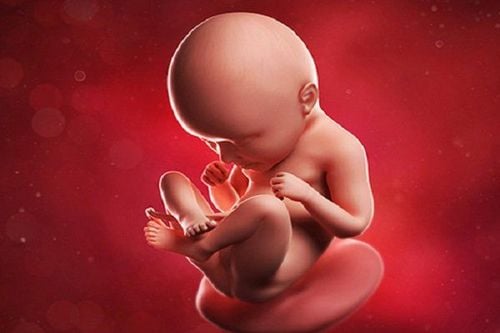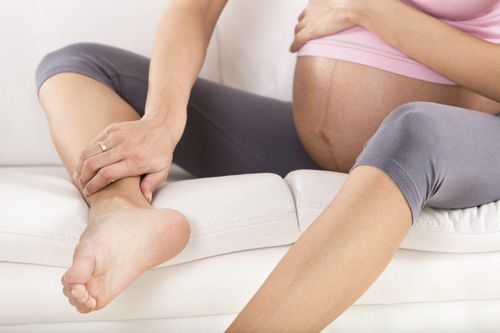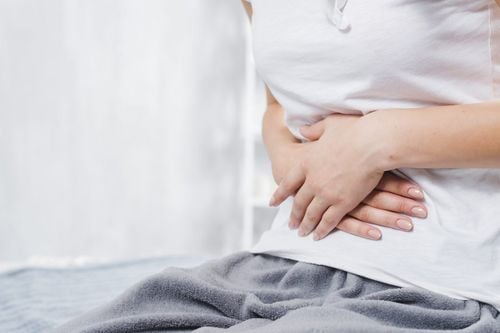This is an automatically translated article.
The article is professionally consulted by Master, Doctor Tran Lam Khoa - Department of Obstetrics and Gynecology - Vinmec Central Park International General Hospital.
Many women experience abdominal pain during their third trimester of pregnancy, this symptom is usually nothing to worry about. However, sometimes you may need to see your doctor to examine and treat abdominal pain during pregnancy.
Abdominal pain is a common symptom of pregnancy, can be pain in the upper epigastrium or lower abdomen in the third trimester, the nature of these pains can be obvious, intermittent or dull pain. There are many causes of abdominal pain, but most are harmless. However, if you're experiencing severe pain, it could be a sign of something serious. Therefore, pregnant women need to go to a medical facility for examination and treatment promptly if any abnormal sensations occur.
This article will cover the possible causes of abdominal pain in the third trimester of pregnancy, how to ease the symptoms and when to see a doctor.
1. Is it normal to have a dull stomach ache?
Abdominal pain is a common symptom in early pregnancy, when the fetus begins to implant in the endometrium. During the third trimester, abdominal pain may return as the uterus has to stretch to accommodate the growing pregnancy. Some women experience heartburn due to gastroesophageal reflux or feel the skin of the abdomen stretching.
If abdominal pain in the last 3 months of pregnancy can be caused by something more serious such as:
When it occurs with other symptoms, such as itching. Sudden or severe abdominal pain. Constant abdominal pain. Pain in a specific location. Pain accompanied by fever, nausea, or vomiting. Pain occurs with vaginal bleeding.
2. Causes of abdominal pain in the last 3 months of pregnancy
Trắc nghiệm: Dấu hiệu cảnh báo chuyển dạ thực sự
Chuyển dạ là quá trình thai phụ bước vào giai đoạn “đẻ đau” để kết thúc thời gian “mang nặng”. Thời gian và dấu hiệu chuyển dạ sẽ khác nhau tùy vào vào từng người và nhiều yếu tố. Theo dõi bài trắc nghiệm dưới đây sẽ giúp bạn hiểu rõ hơn các dấu hiệu chuyển dạ một cách chính xác và an toàn.Many causes of abdominal pain in the last 3 months of pregnancy. However, it can also be a sign of premature labor, placental problems, and other illnesses that can be dangerous for the mother and fetus. Therefore, it is important for women to be cautious and tell their doctor or midwife about any unusual symptoms they experience.
Possible causes of abdominal pain in the last 3 months include:
2.1. Constipation Constipation is one of the most common symptoms of pregnancy. During the first trimester, due to hormonal changes can cause constipation. In the last months of pregnancy, the fetus grows very quickly, putting pressure on the uterus, putting pressure on the pelvis, making it difficult for the mother to have a bowel movement. Along with that is rapid weight gain, lack of exercise are very easy causes leading to constipation in late pregnancy.
Eating foods rich in fiber, drinking enough water can solve the problem of constipation during pregnancy. Alternatively, you can take a laxative to help with constipation, but it's important to discuss it with your doctor or midwife before taking it.

Táo bón khi mang thai có thể gây đau bụng cho bà bầu
2.2 Gastroesophageal Reflux Heartburn is a common symptom, affecting about 17% to 45% of women during pregnancy.
As the fetus grows, abdominal pressure can make this acid reflux worse.
Pain in the upper abdomen can be caused by acid reflux if the pain extends up the chest and behind the breastbone with a burning sensation. To deal with this, you can take some over-the-counter heartburn medications, eat smaller meals, and choose a low-acid diet that can improve symptoms.
2.3. Skin tightening As the pregnancy grows, the uterus expands, causing the skin of the abdomen to stretch. If you only feel itchy skin and feel tightness and pain on the outside of your skin and not deep in your belly, this could be a symptom of tight skin during pregnancy.
Gently massaging the abdomen, applying lotion, and taking a warm bath can help relieve discomfort caused by skin tightening.
2.4. Muscle pain and tension The abdominal muscles must stretch to accommodate the growing fetus. The pressure of the uterus on the lower body can also change the way a woman walks or moves, increasing the risk of injury.
Rest and relaxation can help relieve pain. However, you should see your doctor if the pain does not go away on its own.
2.5. Gallbladder problems Pain in the upper right part of the abdomen, below or near the ribs, can be a symptom of problems with the liver or gallbladder.
If there is nausea or vomiting or severe pain, jaundice, or itching, it could be an abnormal sign.
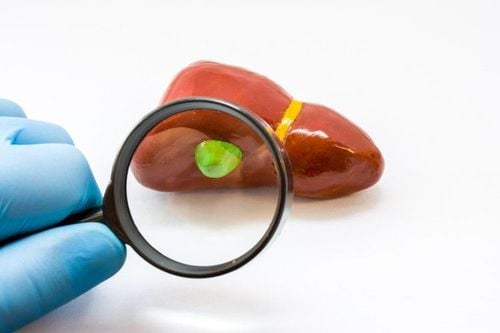
Một số vấn đề về gan hoặc túi mật có thể gây cơn đau bụng cho thai phụ
2.6. Liver problems Hormonal changes related to pregnancy can cause a condition called cholestasis of pregnancy. For most women, the first symptom is itching, vomiting, or yellowing of the eyes or skin.
Doctors must carefully monitor liver health in pregnant women with cholestasis of pregnancy. In some cases, it's important to deliver your baby early to prevent serious complications, including liver failure, and to prevent injury to the developing baby.
2.7. Pancreatitis Pancreatitis is inflammation of the pancreas due to infection, injury, and problems with other organs including the liver and gallbladder, which can cause pancreatitis.
Pancreatitis can cause upper abdominal pain, exhaustion, nausea, or change in stool color.
Depending on the cause of the pancreatitis, you may need to be hospitalized. In some cases, your doctor may prescribe antibiotics or fluids.
2.8. Contractions True labor contractions usually begin at the top of the uterus, causing an intense tightening sensation that gets worse and worse. If you feel contractions starting from the top of your abdomen, this could be a sign of labor. Therefore, pregnant women or their relatives need to go to a medical facility immediately.
3. When to call the doctor for abdominal pain in the third trimester of pregnancy?
Call your doctor or midwife if you have any unusual pain in your stomach or abdomen. At each visit, talk about any symptoms you experienced, their severity, and progression.
Go to the emergency room or call a medical professional right away if:
Severe upper abdominal pain, especially if the pain is on the right side or if the pain is unbearable. Abdominal pain accompanied by vaginal bleeding Contractions occur at regular intervals. Abdominal pain and fever. Symptoms of high blood pressure, such as dizziness, shortness of breath, headache or extreme fatigue Itching, yellowing of the skin or eyes, vomiting. Abdominal pain in the last 3 months of pregnancy should not be ignored because it can be a sign of premature birth. If not treated in time, it can endanger the life of the fetus. As soon as there are signs of unusual pain even transient, you should immediately go to a medical facility for examination and advice.
To protect the health of the mother and baby comprehensively as well as help the mother feel more secure during labor, Vinmec provides a package Maternity service. With this package, the mother will have regular antenatal check-ups and routine tests to monitor her health. The fetus is monitored for fetal heart rate and uterine contractions by obstetric monitor at 37-40 weeks of expected time of delivery. If the baby is born prematurely, they will be cared for and raised with international standards. Premature births are organized in a methodical manner under the coordination of many specialties: obstetrics, anesthesiology, and especially neonatology and paediatrics. This helps to reduce the risks and increase the effectiveness of treatment for health problems that premature babies may have.
If you have a need to use maternity services at Vinmec, please register directly at the website to be served.
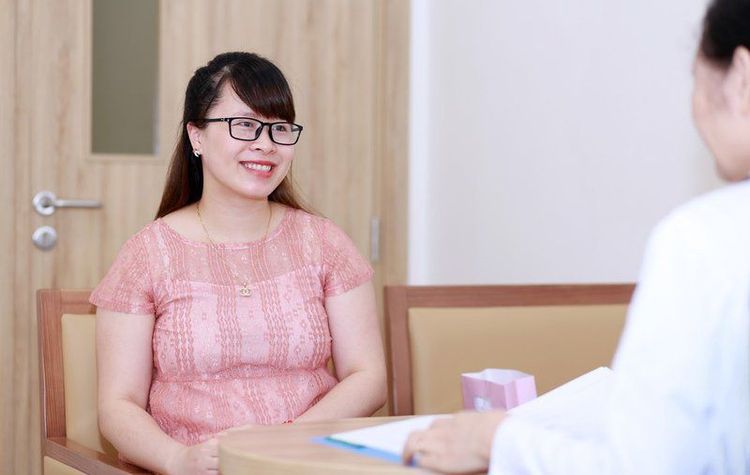
Hình ảnh khách hàng được tư vấn sức khỏe sau khi khám thai tại Vinmec
Please dial HOTLINE for more information or register for an appointment HERE. Download MyVinmec app to make appointments faster and to manage your bookings easily.





